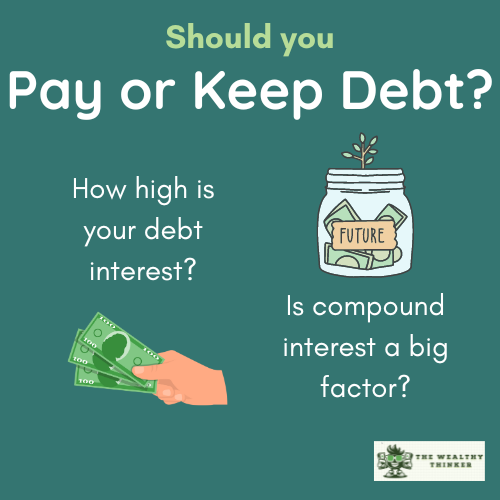Deciding whether you should pay or keep debt is a huge decision.
On one side, if you pay off your debt, you are debt free and have more disposable income that can be used for other financial goals.
On the other hand, the money that goes towards paying off debt could be used for savings and investing. This could provide you with a bigger return.
One isn’t better than the other, because it depends on where you are and which option is right for you. Let’s take a look.
A thought: Before we get into the benefits of whether you should pay or keep debt, something everyone should consider up front is the interest rates.
If you choose to save your money in say, a Certificate of Deposit that earns you an average of 2% interest, instead of paying off a credit card debt at 22% interest, you will be paying more money in interest than you would be saving. Make sure to check these details as you make this decision!

Benefits of paying off debt
If you have any amount of debt, paying it off entirely before you save can be a great option.
When you have debt, you’re making regular monthly payments. When you pay off that debt, you no longer have those monthly payments and can shift that money towards other financial goals – like saving and investing.
Having debt can create a huge amount of stress.
If having debt causes you to worry about your financial security, then paying it off may be the best option. Once you have, you can then focus on saving and investing.
Ways to pay off debt
If you’ve decided to pay off your debt, there are a few strategies to help you.
First, focus on your budget, then expenses to see where you can pinch.
The first thing to look at is your budget.
If you don’t have a budget, start tracking your spending and categorize your spending. Then create a budget.
You should see how much you spend on your wants and needs and monthly debt payments. After creating your budget, you should see how much money you have left. This leftover amount should go towards all of your debt.
Then, look at your expenses.
If your budget doesn’t allow you to put extra money toward your debt, are there areas you can cut back on to save money? Find things in your budget to reduce, like not ordering delivery or cutting a streaming service, and that money can go towards your debt.
Look at your loans
If you have loans you can refinance with a lower interest, look into this as an option to help lower your monthly payments and how much you generally owe.
This can help you save money if you’re not able to pay off your debts very quickly. Then, interest savings can help you put that extra money into your debts.
Get an idea of how much you can pay towards your debt. Then you can use the debt snowball method to pay off your loans.
Start by paying all of your monthly payments. Any extra money will go to your smallest loan. Once that’s been paid off, use that monthly payment amount for the smallest loan and the extra money you have for your second smallest.
By the time you’re at your biggest loan, all of the money you were using for monthly payments for the rest of your loans can be used to tackle that debt. This can simplify the process of paying off even tens of thousands of dollars of debt.
Benefits of saving
Depending on where you are in life, and the level of risk you are willing to take, saving your money in an emergency fund or investment account may be better than paying off debt.
For example, if you have debt and want to just make the monthly payments and use the rest of your money towards savings, you may get a better return on your money.
If you are younger, there is an argument that the money you put into savings, like a brokerage account, can grow to huge amounts through compounding. Investing at a young age can allow you to accumulate a large amount of wealth by putting a small amount down.
If you are younger and want to use compounding to your benefit, it may make sense to focus on saving over paying off debt.
Another reason you may want to save is to save for an emergency fund. For example, you may have a family to care for. Having six months of expenses in a savings account can help in case you lose your job or something happens where you don’t want to go into more debt.
Ways to save
If you’ve decided saving is better for you than paying off your debt, focus on how much you can save every month, saving for retirement, and starting an emergency fund.
As you get used to saving, you will find a way to reduce your current expenses and save more. Having a budget and making a line for saving will help you to actually save every month.
If you want to start saving, focus on retirement first. This can be with a work 401(k) or with an IRA.
Both are great places to start, and you can have both kinds of accounts. Setting money aside for retirement is a great way to allow compounding to work its magic, especially if you are young.
Save for an emergency fund so you can pull from this account instead of going into debt if you are ever in need of money. While you are focused on saving and slowly paying off your debt, you should avoid adding additional debts.
Should You Pay or Keep Debt?
When it comes to whether you should pay or keep debt, you really need to think about your goals.
If having debt causes you to have stress in your life, look into paying it off.
Having that mental clarity from being debt free allows you to focus the rest of your life on saving. The year or two breaks from saving won’t make that big of a compounding difference if you pay off debt and aggressively save after.
However, if you’re not as concerned with having debt and want to use all of your extra income towards saving because of the compound effect this can have, then focus on saving over paying off your debt. Then, you’ll be able to save and pay down your debt with your regular monthly payments.
Editor’s note: This article was originally published Dec 6, 2022 and has been updated to improve reader experience.



















